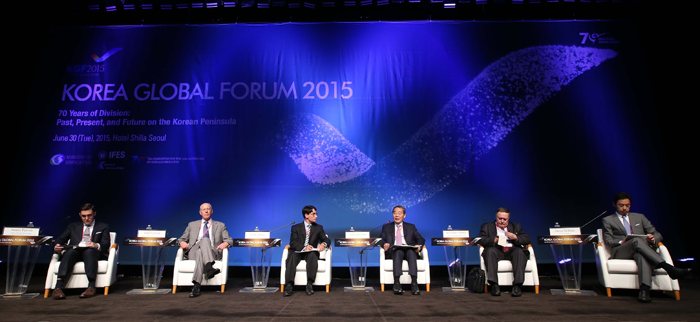Former officials relate views on Korean unification at opening session of ‘Korea Global Forum 2015’
At the opening session of this year’s inaugural public conference of the Korea Global Forum (KGF) 2015, held in Seoul on June 30, former and current high-ranking Korean and foreign officials shared their experience, observations, and views on Korean unification and related issues, including the situation in North Korea and the surrounding political and security environment in East Asia.

The Korea Global Forum is a track 1.5 international multilateral consultative body co-hosted and sponsored annually since 2010 by the Ministry of Unification (MOU) of the Republic of Korea (ROK). Each year, the ministry, in collaboration with local academic organizations, invites government officials and private sector experts from around the world to participate in a series of premier consultations. The overall purpose of the forum is to build international consensus for peace and reunification on the Korean Peninsula. Forums have been held in Korea, Europe, and the United States.
The recently held forum in Seoul kicked off with opening remarks by Jae Kyu Park, former ROK Minister of Unification and current President of Kyungnam University. President Park is most well-known for his pioneering work in North Korean and Korean Unification studies, and for the instrumental role he played as the architect of the historic first-ever inter-Korean Summit of June 2000. He has been recognized internationally for his vision, enterprise, and dedicated efforts in the field, most notably in 2009 when he received the Special Prize of the Jury (for Conflict Prevention) from the Chirac Foundation of France.
In his remarks, Park spoke of how, at the seventieth anniversary of the nation’s liberation and division, an opportunity presents itself to fashion a new vision of relations between North and South Korea to overcome the longstanding division of the peninsula. “In an era of competing national interests . . . South Korea must take the lead to develop and improve inter-Korean relations,” stressed Park. He also emphasized the necessity of removing the distrust in the relationship in order to create a framework for reconciliation and cooperation between the two rival Koreas.

Congratulatory remarks during the opening session were delivered by Chul-ki Ju, Senior Secretary to the President for Foreign Affairs and National Security of the ROK. In his speech, the senior secretary explained that, over the last two years, the incumbent Park Geun-hye administration has worked to construct its ‘Trust Building Process on the Korean Peninsula’, a cornerstone policy in Seoul’s plan to lay a foundation for peaceful unification. He also said that the government has made efforts to initiate dialogue with the North in order to improve actual cooperation between the two Koreas.
Two keynote addresses then highlighted the session.
Delivering the first keynote speech was former career US diplomat, four-time ambassador, and recent author Christopher R. Hill.
Ambassador Hill is best known to Koreans for his service as US Assistant Secretary of State for East Asian and Pacific Affairs from 2005 to 2009, during which time he was also the Head of the US delegation to the Six Party Talks--the high-level track-1 multilateral negotiations established to discuss the North Korean nuclear issue. He is now the Dean of the Josef Korbel School of International Studies of the University of Denver.
Recalling his diplomatic experiences, Hill emphasized the importance of respecting the nuances surrounding the issue of Korean unification and the need to understand the underlying psychology and anguish that many Koreans have felt as a result of this division. He expressed confidence that unification will be achieved.
Noting the complexity and unpredictability of the process to date, including on the nuclear issue, he spoke about the difficulties in dealing with North Korea via multilateral talks, and the apparent current signs of political instability in the regime in Pyongyang. Noting North Korea’s lack of seriousness in the nuclear negotiations and toward economic reform, Hill stressed the need to handle the North Korea issue with a “multi-layered approach”--keeping the door open to dialogue while putting in place suitable defense systems to deal with the DPRK missile and nuclear weapons threats.

On working toward a resolution, he underscored the need for a better political relationship between South Korea and Japan, greater Russian involvement, and China’s special role in the region. In this light, Hill stated that all parties would be best served if they follow one of diplomacy’s most trusted axioms: “No surprises.” That means the United States needs to do a better job of sharing its intentions in the region through in-depth discussions, especially with China. Also, he stressed the dangerousness of North Korea’s nuclear ambitions to regional security, the need for stability, and continuance of the ROK-US alliance based on mutual respect.
The conference’s second keynote address was delivered by Yong-Pyo Hong, current ROK Minister of Unification, who called for actively promoting cultural and history exchanges between the two Koreas. In his speech, Minister Hong explained that peace depends not on relative peace and goodwill alone, but must be based on firm security for the welfare of all people on the Korean Peninsula and on a foundation of mutual trust. In this vein, Hong relayed that the incumbent administration in South Korea would continue to provide much-needed support to improve the livelihoods of average North Koreans, and also promote inter-Korean sports, cultural and history exchanges to recover the homogeneity of the two Koreas.
In the aggregate, the comments of these former and current officials at the inaugural conference of KGF 2015 reveal the aspirations and interests of several parties, and expose the huge geopolitical, economic, and social challenges that lie ahead as South Korea and its neighbors refocus efforts to improve stability in the region, and build consensus for peace and reunification on the peninsula
By Dean J. Ouellette

